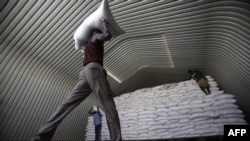More than 7 million South Sudanese will be facing a food crisis by July because of floods, drought and armed clashes.
Food insecurity has worsened since last year. Increased armed violence, population displacement, and climatic shocks such as floods and droughts have played a role, the United Nations and South Sudan government said Saturday in a joint report.
Some 87,000 people in the Pibor Administrative area and parts of Jonglei, Lakes and Unity states are likely to be at catastrophic levels of famine by July. About 2.9 million people will be just one step lower, at emergency levels, according to an analysis of Integrated Food Security Phase Classification data.
More than two-thirds of the population — almost 9 million people — need humanitarian assistance, the U.N. said.
Last year, 5.3 million South Sudanese received food, health, and water and sanitation services as well as education, livelihoods and nutrition assistance.
"We will continue to have the situation we have in South Sudan if we don't start to make that transition to ensuring peace at the community levels," U.N. Humanitarian Coordinator in South Sudan Sara Beysolow Nyanti said.
According to Saturday's report, Unity, Jonglei, Upper Nile, Warrap and Eastern Equatoria states will suffer the most from the food shortages.
"Until conflict is addressed, we will continue to see these numbers increase because what it means is that people do not have safe access to their lands to cultivate," said Adeyinka Badejo, World Food Program acting country director in South Sudan.
South Sudan gained independence from Sudan in 2011 and has struggled with political and economic crises since then. A five-year civil war killed almost 400,000 people.
Although a 2018 cease-fire and power-sharing deal between President Salva Kiir and his deputy Riek Machar is still in place, the conflict continues. The U.N. has criticized both leaders for incentivizing violence and corruption.
The U.N. Mission in South Sudan has increased the number of peacekeepers it has deployed and is working with communities in Leer in Unity State to ease ongoing tensions. They are working with local authorities to protect displaced families and provide them with access to clean water and health care.
The South Sudan People's Defense Forces are also reportedly working in Leer to restore order amid the growing humanitarian crisis stemming from the worst flooding in decades.
VOA United Nations correspondent Margaret Besheer contributed to this story. Some information in this report came from Agence France-Presse.






